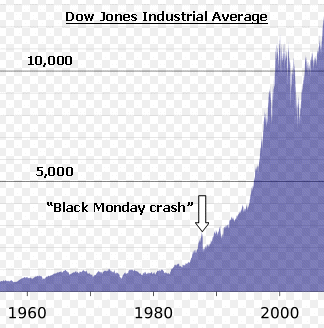 |
 |
| A virtual coffeehouse for technological minds and ideas | |
|
The psychological bias of prediction If I had to name a day when I lost my belief in expert predictions it would be Monday, October 19,1987 – also known as “Black Monday.” That day the Dow Jones Index dropped 500+ points in the financial market.
My favorite TV channel at the time was a financial news channel
on Cable. On that day, and over the next several weeks, they
brought on a steady stream of financial “experts” to give
analysis of what had happened and predictions of the probable
future of the financial markets. This was the first major event
I Another major event was Y2K. I had two computers in 1999. My older machine had an 80386 processor and was running Windows v. 3.1. According to several tech magazine articles that I read this system was at risk for a Y2K (Year 2000) malfunction. I doubted that Microsoft or the BIOS developer would be so careless as to have this vulnerability since the system was built less than 15 years before 2000, but I checked and tested it anyway. I went through the BIOS setup and confirmed that the year was processed as a four digit number then set the system clock for 11:55 p.m., 12/31/1999, opened some programs, and waited for the change to 12:00 a.m. 1/1/2000. Everything continued to work fine. At that point I realized that the issue was being exaggerated – probably by quite a bit. To be fair, there was much remedial work done to computer and control systems prior to the turn-over date, but very little of significance happened anywhere in the world. Almost nothing that was predicted. So why do the experts tend to predict these types of things so inaccurately? There’s certainly a self-serving motive factor. For Black Monday it’s a poorly kept secret that some people will talk-down the market in order to help create a low-cost buying opportunity for stocks and assets (the important first half of “buy low, sell high”). In the case of Y2K, there was an irresistible temptation on the part of the tech market to leave businesses and consumers a little worried so they would decide to buy new equipment and software – just to be on the safe side. I’m not so cynical as to believe that this is the whole reason, or even the main reason of several, however. I think that many honest, well-intentioned experts have a tendency to be subconsciously biased by an optimistic or pessimistic predisposition. If you have a tendency towards pessimism you may recognize mostly the negative factors of an issue or event, and ignore the positive factors such as human actions of adjustment and correction. You may also tend to simply extrapolate from a temporary downward trend in order to predict the future. Both are flawed, but unfortunately common patterns of human behavior – even among the most intelligent. So how do we get the best possible view of what the future will hold if we can’t rely on the experts to tell us? Have faith in yourself and do your own objective homework. Don’t just accept the view that matches your own inclinations. Read or listen to what the other side has to say as well. Never simply assume that a current trend will continue in the same direction indefinitely – it rarely does. Consider the probability that corrective processes or actions will occur. Do research to look for comparisons from the past – history tends to repeat itself and a historical perspective is usually invaluable. If you weigh all these things and think for yourself then your own predictions will be as good as anyone else’s.
|
add to favorites
|
 del.icio.us
del.icio.us
 Slashdot It!
Slashdot It!
 Stumble It!
Stumble It!
Home | About Us | Advertise | Submit an Article | Submit a Link | Contact Us
ElectronCafé.com is a registered property of electricalfun.com Copyright © 2007 - All rights reserved
 had witnessed since becoming interested in economics, and I
was completely amazed at the broad and conflicting range of
these predictions. Some believed it was just a needed correction
of an inflated high, and others anxiously claimed it was just
the beginning tip of the iceberg of an inevitable US market
collapse. The event was the largest single-day decline in stock
market history (as a percentage), but as it turned out, the Dow
Jones Industrial Average ended the year 42 points higher than it
began and continued to do well in ‘88.
had witnessed since becoming interested in economics, and I
was completely amazed at the broad and conflicting range of
these predictions. Some believed it was just a needed correction
of an inflated high, and others anxiously claimed it was just
the beginning tip of the iceberg of an inevitable US market
collapse. The event was the largest single-day decline in stock
market history (as a percentage), but as it turned out, the Dow
Jones Industrial Average ended the year 42 points higher than it
began and continued to do well in ‘88.